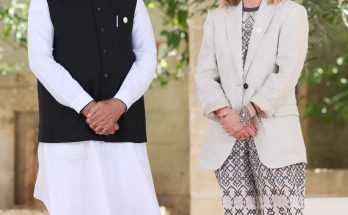
In sync with its burgeoning partnership with New Delhi, Denmark, a Nordic powerhouse synonymous with green development, has been prompt in joining other EU nations to provide Covid-related support to India reeling under an unprecedented second wave of the coronavirus pandemic. The pandemic-related cooperation is just one facet of the multidimensional partnership between India and Denmark. In a wide-ranging conversation with Manish Chand, Founder-CEO and Editor-in-Chief, India Writes Network and India and The World magazine, Denmark’s Ambassador to India Freddy Svane outlines the scope of Green Strategic Partnership between the two countries and highlights a wide array of opportunities for mutually empowering partnership between India and Denmark.

Denmark’s Ambassador to India Freddy Svane with Manish Chand, CEO & Editor-in-Chief, India Writes Network
Looking ahead, the envoy underlined that Denmark can be a natural ally of India in the fight against climate change even as their relationship evolves from being green technology partners to other serious areas of global concerns. The Danish diplomat, an ardent believer in India’s destiny as a major global power, has no doubt that India will emerge from this crisis stronger and set new benchmarks for global leadership.
(Excerpts from the interview)
Green Strategic Partnership
Q) The leaders of India and Denmark had a very successful summit in September last year. Building upon that summit, what are high-growth areas of cooperation between the two countries.
A) The whole idea at the virtual summit was to connect Denmark and India, based on the mantra of your prime minister. India has the scale; Denmark has the skills. We also added speed because things will need to speed up here as well. The idea was to find out where Denmark and India could cooperate to address some of the big issues that we are all facing like climate change. So, that led us to the idea of opting for what you call a Green Strategic Partnership. The idea is to share our skills, solutions, and experiences with India to help India adapt to a green transformation.

We know that India is in the process of a huge transformation; and based on the views of Prime Minister Narendra Modi, India would need to develop more sustainably. That thrust reaches back to the time when he was the chief minister of Gujarat. So, the idea of green transformation is a new way of defining our economic policies and geopolitical strategies. In that this context, Denmark can offer a lot of solutions that can be implemented in India, be it water or clean energy.
When it comes to water, it’s related to upstream and downstream (management), and Denmark has developed skills in that area over the years; all the water that we drink in Denmark comes from the underground. So, we know how to ensure that the drinking water is safe and meeting all the hygienic and qualitative criteria. One important area in this context is that we are looking into the Jal Jeevan Mission of the Indian government. In our capital Copenhagen, which is home to one-third of our population, non-revenue water, or water leakage, accounts for 3 to 4%, whereas in India, it crosses by more than 50%.
Secondly, drinking water consumption per capita in Denmark has reduced by 40 to 50% since the 1980s. But how can you do that? You can use technology, and innovation, but you also need awareness. With the Jal Jeevan mission, the government is putting a major focus on this area. So, Denmark would like to share its experience and expertise in this field with India. Furthermore, when it comes to the tap-water, you also need to ensure that it is safe to drink.
Energy Cooperation
Q) How can India and Denmark enhance energy cooperation?
A) Denmark leads the world when it comes to clean technology or green energy, especially wind power. In 2019, more than 44% of all electricity consumed in Denmark came from wind energy. We have developed a wind industry that spans many years. It all started with the oil crisis in the early 1970s. At that time, we were 100% dependent on fossil fuels, which were imported. And then suddenly the supplies stopped, and we had to reinvent our system and that led to the green transformation of the Danish society. It is one of the things that we are proud of and we would like to share with India. Green transformation is not necessarily a political statement, but a way to generate new permanent jobs. For instance, the Danish wind sector is a multi-billion-dollar industry that has created thousands of jobs.

We know the Indian government is very ambitious on renewables such as solar and wind power. We will be happy to share our experiences in this area. We would like to see more and more investments coming to India. Our big companies are keen on investing in this sector, and we had followed this up in the virtual summit in 2020. Danish companies also had a one-to-one discussion on wind turbines with the Indian prime minister. Our companies expressed their desire to invest more in India as they consider it as a potential global hub for the wind industry. At that time, investors also launched the idea of an India-specific wind turbine, designed in accordance with local conditions. The idea is to produce wind turbines here and export them outside the country. So, it will be both domestic and export-oriented industry.
We have green skills, while India has scale; we need to add speed because if India is not part of the green transformation, we will never be able to do something serious about climate change. We will not be able to secure the global Sustainable Development Goals (SDGs). India has to be part of the equation, and we are happy that India and Denmark could join hands. As Prime Minister Modi said, it is a new age partnership.
Furthermore, the Green Strategic Partnership covers many other fields, and one of them is green shipping. India is one of the big shipping nations, and hence, a new vision will be developed soon. The Gujarat Maritime University has concluded a pact with the Copenhagen Business School for a Blue MBA. So, there are many fields where we can work together. The Danish side has put forward an advanced plan encompassing four areas: Energy, Water, Climate, and Financing. The idea is to have an advanced plan in which we are looking for early tangibles and results. Besides, we need to bring in different tools that we have to support further investments in India. Additionally, we’ll have a working action plan which is under preparation.
India-EU Summit
Q) India and the EU are set to hold their second digital summit on May 8. How do you look at the future of India-EU cooperation?
A) India is rightly looking increasingly towards Europe, and for good reason; Europe is also keen to work closely with India. We need to further develop our joint strategy, and in that regard, a lot of new initiatives can be expected soon. The EU and India already have a strategy. It is heartening to know that India is also reframing its European strategies, looking even more closely at the smaller European countries. It’s important because when you build a house, it’s not only the big boxes that are important, they might be important pillars, but to make the house well-functioning, you also need to have smaller stones and bricks. We think it is important for India as it is for Denmark – to work even more closely.
Europe-China Ties
Q) How do you look at Europe’s ties with China in view of growing anti-China sentiments across the continent?
A) The pandemic has shown that you need to look into how you can strengthen international cooperation. I think that will also happen. We have to look into how our international cooperation can be strengthened to cope with pandemics. The Indian foreign minister has recently spoken about two other important international topics in which there is a need for even stronger collaboration: climate change and immigration. The EU has defined its policy towards China as not only a partner but also as a competitor. And I think Denmark is mirroring herself into that context.
India’s Global Rise
Q) How do you look at India’s rise as a global power?
A) India is the world’s largest democracy, a huge and vibrant democracy. India will always be an important player. We can learn a lot from the “Indian Way,” (as described by India’s foreign minister). In the first wave of the pandemic, India combined the four Ss – Skill, Scale, Speed and Scope – to handle the pandemic efficiently. Looking ahead, India’s role will have to grow in the years ahead because a stronger India serves the interests of the rest of the world.
In my personal view, a strong India is a prerequisite for an even stronger development of the rule of law and democratic principles. A strong independent India that defines her interests on her own, but also in collaboration with the outside world. The economic dependence of the outside world on India has increased significantly in recent times.
India-Nordic Summit
Q) Denmark will host the second India-Nordic summit in June this year. What can one expect from the India-Nordic summit?
A) Given the outreach from the Indian side to work even more closely with the Nordics, the second summit, after the first one in Stockholm, holds an important significance. We hope it will create a platform for even stronger cooperation. If we combine the five Nordic countries – our economic strengths and innovative skills – we are perhaps the 12th or 13th largest economy in the world. We will be an even stronger partner of India in the future.
Author Profile

- Manish Chand is Founder-CEO and Editor-in-Chief of India Writes Network (www.indiawrites.org) and India and World, a pioneering magazine focused on international affairs. He is CEO/Director of TGII Media Private Limited, an India-based media, publishing, research and consultancy company.
Latest entries
 India and the WorldJuly 9, 2024Defying West, India sets $100 billion trade target with Russia
India and the WorldJuly 9, 2024Defying West, India sets $100 billion trade target with Russia India and the WorldJuly 5, 2024India at SCO: Takes swipe at Pakistan for cross-border terror, pushes alternative to BRI
India and the WorldJuly 5, 2024India at SCO: Takes swipe at Pakistan for cross-border terror, pushes alternative to BRI India and the WorldJune 14, 2024Modi’s Day 1 in Italy: Bonding with Britain, France
India and the WorldJune 14, 2024Modi’s Day 1 in Italy: Bonding with Britain, France India and the WorldJune 13, 2024G7 summit in Italy: Modi to showcase India as leader of Global South
India and the WorldJune 13, 2024G7 summit in Italy: Modi to showcase India as leader of Global South






